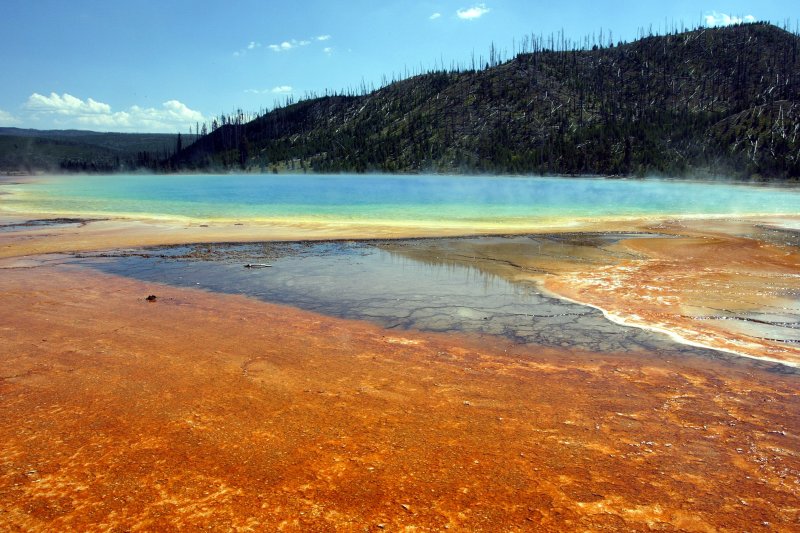New research suggests heat from an intruding slab of oceanic mantle is fueling Yellowstone's volcanic system. Photo by A.J. Sisco/UPI |
License Photo
Dec. 18 (UPI) -- A simple mantle plume can't account for the size and complexity of the volcanic system beneath the western United States. Instead, researchers believe Yellowstone volcanism derives much of its heat and power from the instruction of oceanic mantle.
"The heat needed to drive volcanism usually occurs in areas where tectonic plates meet and one slab of crust slides, or subducts, under another," Lijun Liu, a professor of geology at the University of Illinois, said in a news release. "However, Yellowstone and other volcanic areas of the inland western U.S. are far away from the active plate boundaries along the west coast."
Scientists have long suspected a deep-lying mantle plume was Yellowstone's source of heat -- driving the system's crustal melting and magmatic activity.
Liu and his researcher partners, graduate students Quan Zhou and Jiashun Hu, used seismic tomography to map the deep geologic structures beneath Yellowstone and the western United States. They plugged their findings into models designed to consider various scenarios of geologic evolution over the last 20 million years.
"Our goal is to develop a model that matches up with what we see both below ground and on the surface today," Zhou said. "We call it a hybrid geodynamic model because most of the earlier models either start with an initial condition and move forward, or start with the current conditions and move backward. Our model does both, which gives us more control over the relevant mantle processes."
Surprisingly, the researchers' models showed the mantle plume beneath the western United States has been sinking deeper over time -- the opposite of what scientists expect hot rock to do.
"This suggests that something closer to the surface -- an oceanic slab originating from the western tectonic boundary -- is interfering with the rise of the plume," Liu said.
The new analysis -- published this week in the journal Nature Geoscience -- suggests Yellowstone's volcanism was spawned by a slab of shallow oceanic mantle originating from beneath the ocean floor of the coast of the Pacific Northwest.
The research can't yet offer insights into the likelihood of a catastrophic Yellowstone eruption.
"Our model can't predict specific future super-eruptions. However, looking back through 20 million years of history, we do not see anything that makes the present-day Yellowstone region particularly special -- at least not enough to make us suspect that it may do something different from the past when many catastrophic eruptions have occurred," Liu said.















